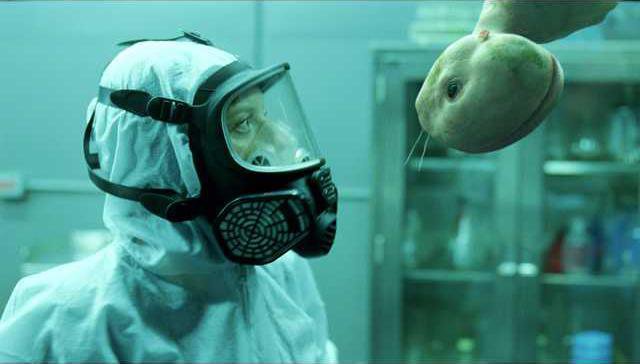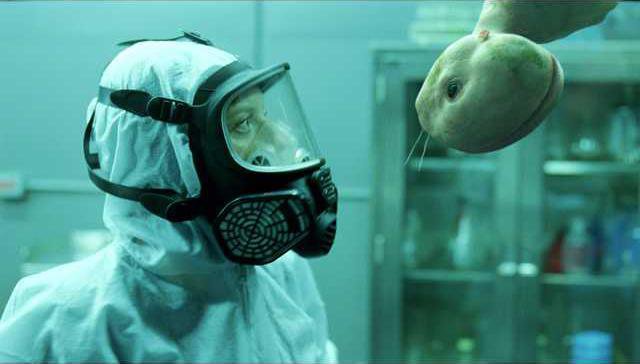‘Splice’
Starring: Adrien Brody, Sarah Polley, Delphine Chanéac
Rated: R for disturbing elements including strong sexuality, nudity, sci-fi violence and language
Running time: 104 minutes
Bottom line: Smart, shocking, must-see sci-fi
"Splice" is what you get if you make Frankenstein female and oddly beautiful, give her hip quirky parents and have Sigmund Freud write the screenplay.
This unique science-fiction sleeper is the first pleasant surprise of what has been a predictable, disappointing summer. I went in expecting something schlocky and exploitative (which still might have been fun). Instead, "Splice" is fascinating, pointedly shocking and smarter than the trailers suggest.
Clive (Adrien Brody) and Elsa (Sarah Polley) are geneticists who have tried for years to produce an animal protein that could be used to develop medicines. They are also lovers who disagree on whether or not they want children.
Working for a big biotech firm, they successfully combine the DNA of several animals into two new organisms — two veinous, slimy blobs of flesh nicknamed Fred and Ginger — from which they can extract tissue and cell samples.
Fred and Ginger show no similarities to humans or any recognizable animal. So it’s easy to treat them (and mistreat them) like specimens. But Clive and Elsa, mostly Elsa significantly, take their research a big step further and add human DNA into the mix.
This time they produce a creature with the features of a few different animals but also distinctly human face and skin. Clive initially wants to kill "it," partly because he worries it is suffering from being malformed. But Elsa warms to it quickly as her maternal instincts kick in.
Like the best science fiction, "Splice" builds a story around existing science and ethical issues. The scenario echoes debates over cloning, stem cell research and classic questions about who is the real monster — the creature or its creator. The fascination with the body is very reminiscent of David Cronenberg’s earlier work ("The Fly," "Dead Ringers").
But the movie weds its updated Frankenstein story with a domestic drama. Once Dren (Delphine Chanéac) is born, we watch Clive and Elsa take on parental roles, sometimes by choice and sometimes unwittingly.
The child means certain things to each of them. Elsa was raised by a mentally unstable, abusive mother, so Dren allows Elsa to dabble in motherhood without fully committing. Motherhood also brings out a disturbing side of Elsa’s personality. Clive transitions from viewing Dren as a mistaken experiment to taking on a paternal role. The climax of the movie comes when Clive engages in some disturbing behavior of his own.
Meanwhile, Dren loves Elsa like a mother, but as she reaches a teenage level of maturity, she rebels against Elsa.
You don’t have to be a Freudian psychologist to understand all of this. Brody and Polley are excellent, and the writers skillfully create dialogue with multiple meanings. Are Clive and Elsa discussing a scientific experiment, a child or both?
Dren is such a bizarre role that it’s hard to predict whether this will make Chanéac a star, but she certainly deserves it. She doesn’t speak in words and half of the character’s appearance is computer-generated, yet Chanéac imbues Dren with innocence, wrath and naïve sexuality. Dren’s behavior will be familiar to any parent, and we sympathize with her as much as any character.
Except for one thing: Dren IS part monster. She is a powerful creature and when she lashes out, it’s more than just storming off and slamming the door to her room. She has a tail with a venomous stinger. How’d you like to discipline a child with that thing wagging behind her?
As the story grows more preposterous and pushes certain ethical and parental buttons, viewers will either be enthralled, aghast or repulsed, but they will not look away.
Note that I’ve called "Splice" science fiction. For 90 minutes, that’s what it is. It doesn’t become a horror film until the final 15, when the filmmakers provide some action and gore.
Even when they go for this big, not-worth-the-rest-of-the-film ending, though, the story takes such outrageous turns that you’ll be pondering it for a while afterward.
Jeff Marker is a media studies professor at Gainesville State College.

